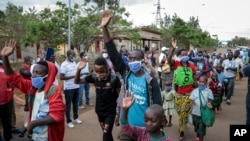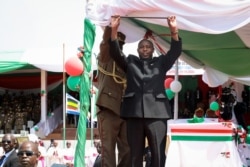Disembarking from one of 20 large tour buses on the Rwanda side of the Gasenyi-Nemba border crossing, Emanuel Biziman couldn't contain his tears of joy at nearing his native Burundi.
“Oh, I will finally find my relatives!” said Bizimana, amid the shouts and cries of more than 500 refugees preparing to cross into Burundi.
Arriving Thursday, the refugees were in the first contingent of Burundians to be repatriated en masse from Rwanda since fleeing their homeland five years ago. Roughly 350,000 had left Burundi – mostly for neighboring countries – after violent protests in 2015 sparked by then-President Pierre Nkurunziza’s move to secure a controversial third term.
Nkurunziza's unexpected death in June has led many to believe they can safely return home under the leadership of new President Évariste Ndayishimiye.
“I decided to return because I heard that my country has recovered peace," said Marie Chantal, carrying a child on her back while holding another by the hand and balancing a large bag of clothing on her head.
Like many of the travelers making the eight-hour bus ride from Rwanda’s Mahama refugee camp, she wasn’t certain what kind of life awaits in Burundi. The repatriated refugees were to be tested for COVID-19, then assigned to spend their first three nights at a transit facility in Ngozi, some 36 kilometers to the south. Officials said they would be debriefed by local authorities and reunited with loved ones as they attempt to rebuild their lives.
Chantal expressed hope: "I am reassured that nothing bad is going to happen to me.”
Bilateral assurances
That’s the intent of the August 13 repatriation deal facilitated by the United Nations High Commissioner for Refugees (UNHCR) office in coordination with Rwandan and Burundian government officials.
UNHCR officials – who had successfully organized an October 2019 repatriation of Burundians from Tanzania – issued a statement Friday expressing confidence in the U.N. agency’s "readiness to assist any refugee who voluntarily requests to return and to provide the necessary logistical support needed, including transport, food aid and medical kits."
But the repatriation is unfolding against a tense political backdrop, as statements by coordinators on the ground in the African Great Lakes region suggest.
“This is irrefutable evidence that we do not constitute an obstacle to the return of Burundians, as claimed by the government of their country,” said Olivier Kayumba, permanent secretary in Rwanda’s Emergency Management Ministry, which oversees refugees. “We are open with the UNHCR to repatriate even others who wish.”
Ties between the neighboring countries have been strained since Rwandan President Paul Kagame criticized his then-Burundian counterpart, Nkurunziza, for seeking a third term. The new Burundian head of state, Ndayishimiye, recently accused Rwanda of preventing Burundians from voluntarily returning, choosing to hold them "hostage" instead.
But Bubacar Bamba, UNHCR’s deputy representative in Rwanda, is optimistic.
The pact has produced "a good fruit of return of over 500 people," said Bamba, adding that the current group — mostly women and children originally from Burundi's northern province of Kirundo — are among at least 1,800 who have indicated willingness to return.
Bamba said that voluntary returns are to be scheduled on a monthly basis.
Rwandan officials say nearly 6,000 Burundian refugees had voluntarily returned since 2015 until Rwanda closed its borders in March because of the coronavirus pandemic. Still host to more than 65,000 Burundian refugees — with most living in the Mahama camp — Rwanda’s government has said it will continue to assist any refugee who wants to return but also will protect refugees and asylum seekers remaining on its territory.
Official welcome
On Thursday, General Gervais Ndirakobuca, Burundi’s interior and security minister, went to the border to welcome the refugees, presenting a national flag to the group.
Joined by a contingent of fellow Burundians, including Health Minister Thadee Ndikumana and a handful of religious and local leaders, Ndirakobuca said he hoped the remaining refugees would soon follow suit.
"We ask others who are staying in Mahama camp, or urban refugees, to come back, too, because the country is calm and needs them," he said.
After a few days in the transition camp, refugees were expected to be released “to their respective families and neighborhoods, where they will undergo some kind of debriefing with local authorities,” the interior minister told VOA in a phone interview Friday.
“The government of Burundi sees the return of those refugees as a testimony to the universal saying that lies will not last forever,” Ndirakobuca said. “Those refugees have realized that they have been lied to and have ultimately decided to return and to join their brothers and sisters in developing their beautiful country.”
Ndirakobuca also said that Burundian refugees from Tanzania and the Democratic Republic of Congo have written to seek assistance from Burundi, UNHCR and the host countries to return home.
According to UNHCR, repatriated Burundians are sent back with cash grants equivalent $70 USD, and sometimes with in-kind supplies or household items.
A man who identified himself only as Félix B. urged Burundian authorities to protect returnees.
“This is a decisive comeback for us and those we leave behind. We have battled with fear. If ever we are mistreated, the others will not come,” he told VOA. He added that a supportive reception “will cause a great return of Burundians.”
This story originated in VOA's Central Africa service, with Frederic Nkundikije contributing reporting from Washington. Some information is from AP, AFP and Reuters wire services.








